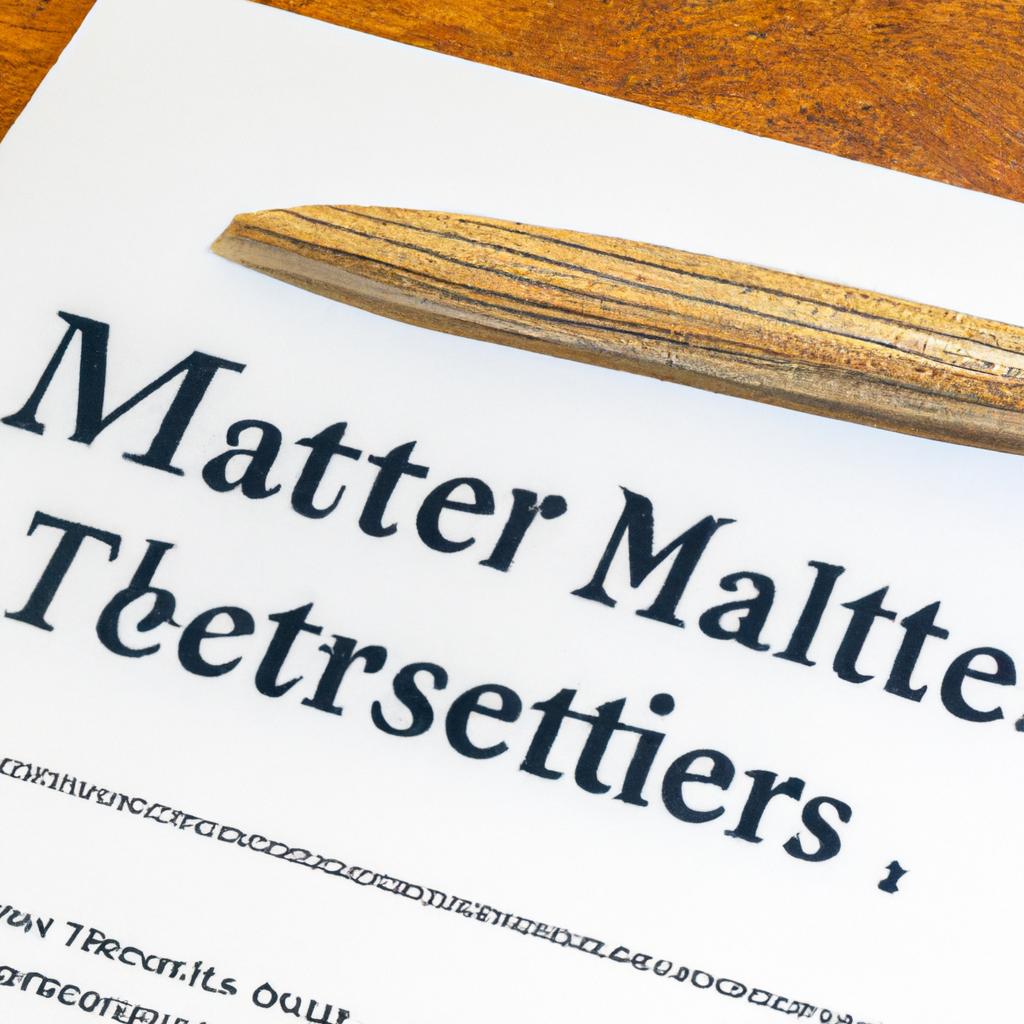In the intricate realm of estate administration, the absence of a last will and testament can present a daunting challenge for those tasked with settling the affairs of a deceased loved one. When navigating the complex legal landscape of distributing assets without a will, the issuance of a letter of testamentary becomes a crucial piece of the puzzle. As seasoned practitioners in the field of probate and estate law, the experts at Morgan Legal Group understand the intricacies involved in obtaining a letter of testamentary without a will in place. Join us as we delve into the essential details and intricacies of this key instrument in the administration of estates.
Understanding the Concept of Letter of Testamentary
When a loved one passes away without a will, the process of distributing their assets can become more complicated. In this case, a letter of testamentary is often required to appoint an executor to handle the deceased’s estate. This legal document allows the executor to access the deceased’s bank accounts, pay debts, and distribute assets according to state law.
Without a will in place, the court will typically appoint an executor based on state law. The letter of testamentary serves as proof of the executor’s authority to act on behalf of the estate. It is important to consult with an experienced estate planning attorney to navigate the probate process and ensure that the deceased’s assets are distributed according to their wishes.

Key Differences Between Letter of Testamentary and Will
When it comes to the complexities of estate planning, understanding the key differences between a Letter of Testamentary and a Will is crucial. A Letter of Testamentary is a legal document issued by a probate court that authorizes an executor to oversee the distribution of assets according to the deceased’s wishes. On the other hand, a Will is a legal document that outlines how a person’s assets should be distributed upon their death.
One of the main differences between a Letter of Testamentary and a Will is that a Will is typically created by the individual before their passing, while a Letter of Testamentary is only issued after the individual has passed away. Additionally, a Will must go through the probate process, while a Letter of Testamentary allows the executor to bypass probate court and distribute assets more quickly. Understanding these differences can help ensure that your loved ones’ wishes are carried out smoothly and efficiently.

Navigating the Process of Obtaining a Letter of Testamentary
When it comes to without a will, there are several key steps to keep in mind. First and foremost, it is crucial to determine who will be appointed as the executor of the estate. This individual will be responsible for managing the deceased’s assets, distributing property to beneficiaries, and ensuring that all debts and taxes are paid.
<p>Next, the executor must file a petition with the probate court to request the appointment of a letter of testamentary. This legal document grants the executor the authority to act on behalf of the estate. The court will review the petition and, if approved, will issue the letter of testamentary. From there, the executor can begin the process of settling the estate and carrying out the deceased's final wishes.</p>

Expert Recommendations for Handling Letter of Testamentary Matters
When facing the complex process of handling a letter of testamentary matter without a will, it is crucial to seek guidance from experienced professionals in the field of estate planning and probate law. Without a will dictating the distribution of assets, the distribution of the estate can be a challenging and time-consuming process. To navigate these waters successfully, consider the following expert recommendations:
- Consult an Attorney: Seeking guidance from a knowledgeable probate attorney can help ensure that the letter of testamentary matter is handled correctly and efficiently.
- Obtain Legal Advice: It is important to fully understand the legal implications of the letter of testamentary matter and the potential impact on the distribution of assets.
- Review State Laws: Each state has specific laws governing intestate succession, so it is essential to familiarize yourself with the laws in your jurisdiction.
Additionally, when dealing with a letter of testamentary matter without a will, it is advisable to communicate openly and transparently with all parties involved in the estate distribution. By working collaboratively and seeking expert advice, you can navigate the process effectively and ensure a fair and timely resolution.
| State Laws | Importance |
|---|---|
| New York | Specific laws governing intestate succession |
| California | Legal implications of distributing assets without a will |
| Florida | Guidance from knowledgeable probate attorney |
Q&A
Q: What is a letter of testamentary without a will?
A: A letter of testamentary is a legal document that gives someone the authority to act as the executor of an estate. This can happen even if there is no will left behind by the deceased.
Q: How does someone obtain a letter of testamentary without a will?
A: In order to get a letter of testamentary without a will, a petition must be filed with the probate court. The court will then determine who should be appointed as the executor of the estate.
Q: What happens if there is no will and no one applies for a letter of testamentary?
A: If there is no will and no one steps forward to request a letter of testamentary, the court may appoint a public administrator to handle the estate.
Q: Can the executor of an estate without a will distribute assets as they see fit?
A: No, the executor must follow state laws regarding intestate succession, which dictate how assets should be distributed when there is no will.
Q: Are there any disadvantages to not having a will when it comes to obtaining a letter of testamentary?
A: One potential disadvantage is that there may be more complexity and time involved in the probate process without a will. Additionally, the court will ultimately decide who should be appointed as the executor of the estate.
Concluding Remarks
In conclusion, obtaining a letter of testamentary without a will can be a complex and challenging process. However, with the appropriate legal guidance and support, it is possible to navigate through the intricacies of probate court and ensure that the deceased’s estate is settled properly. If you find yourself in a situation where you need to acquire a letter of testamentary without a will, don’t hesitate to seek the expertise of a qualified attorney to assist you in resolving the matter efficiently and effectively. Remember, the road to probate may be rocky, but with the right guidance, you can find your way to smoother waters.
 What is a Letter of Testamentary Without a Will and How Does it Work?
What is a Letter of Testamentary Without a Will and How Does it Work?
In life, we often have many things on our minds and sometimes creating and updating a will is not one of them. Unfortunately, this can lead to a lot of confusion and complication when it comes to distributing assets and carrying out the final wishes of a deceased loved one. This is where a letter of testamentary without a will comes into play. In this article, we will delve into the ins and outs of this legal document, its purpose, and how it works.
A letter of testamentary without a will, also known as letters testamentary or letters of administration, is a legal document that is issued to an individual or individuals by the probate court. This document grants authority to the named individual(s) to manage the estate of a deceased person who did not leave behind a will. It essentially gives the person(s) named the same powers and responsibilities as an executor would have if there was a will in place.
In order to understand how a letter of testamentary works, let’s first take a closer look at the probate process.
The Probate Process
When a person passes away, their estate goes through a legal process known as probate. This process involves the court overseeing the distribution of the deceased’s assets and paying off any outstanding debts. In most cases, this process is carried out based on the terms outlined in the will left behind by the deceased. However, if there is no will present, the court will appoint an administrator, usually a family member or close friend, to manage the estate and distribution of assets.
This is where the letter of testamentary comes into play. Once the administrator is appointed by the court, they will be issued the letter of testamentary, giving them the legal authority to carry out their responsibilities.
How a Letter of Testamentary Works
As mentioned earlier, a letter of testamentary gives the named individual(s) the same power and responsibilities as the executor of a will. This includes collecting and managing the deceased’s assets, paying off any outstanding debts or taxes, and distributing the remaining assets to the heirs.
The letter of testamentary acts as proof that the administrator has the authority to handle the deceased’s affairs. This is especially important when it comes to dealing with banks, financial institutions, and other organizations that may require legal authorization.
In most cases, the administrator will also have to post a bond, which serves as a type of insurance to protect the estate from any potential mishandling of assets by the administrator. This bond is usually paid for by the estate and is based on the value of the assets. Additionally, the administrator will also have to provide a detailed inventory of the assets and their value to the court.
Benefits and Practical Tips
As you can imagine, the probate process can be lengthy and complicated, especially when a will is not present. However, a letter of testamentary can help make the process smoother and less stressful for all involved parties. Here are some of the benefits of having a letter of testamentary without a will:
1. Provides legal authority: Without a letter of testamentary, it can be difficult for an administrator to prove to third parties that they have the legal authority to handle the deceased’s affairs. This can cause delays and complications in the distribution of assets.
2. Clear instructions: The letter of testamentary outlines the responsibilities and powers of the administrator, making it easier for them to know what needs to be done.
3. Protects the executor: In some cases, conflicts may arise between family members over the distribution of assets. By appointing an administrator through a letter of testamentary, the court removes any potential bias or conflict of interest, protecting the executor from any accusations of mishandling assets.
While a letter of testamentary can help make the probate process smoother, it is important to keep a few things in mind:
1. It may take time: Even with a letter of testamentary, the probate process can take several months or even years to complete. This is due to court technicalities and potential disputes among heirs.
2. Seek professional help: The probate process can be complicated, and it is always best to seek help from a legal professional who can guide you through the process and help ensure that everything is done correctly and in a timely manner.
Conclusion
In a perfect world, we would all have a will in place to ensure that our final wishes are carried out and our loved ones are taken care of after we are gone. However, life can be unpredictable, and sometimes things can slip through the cracks. In such cases, a letter of testamentary without a will can help bring order to a potentially chaotic situation. By understanding the purpose and process of the letter of testamentary, you can be better prepared in the event of the unexpected.

